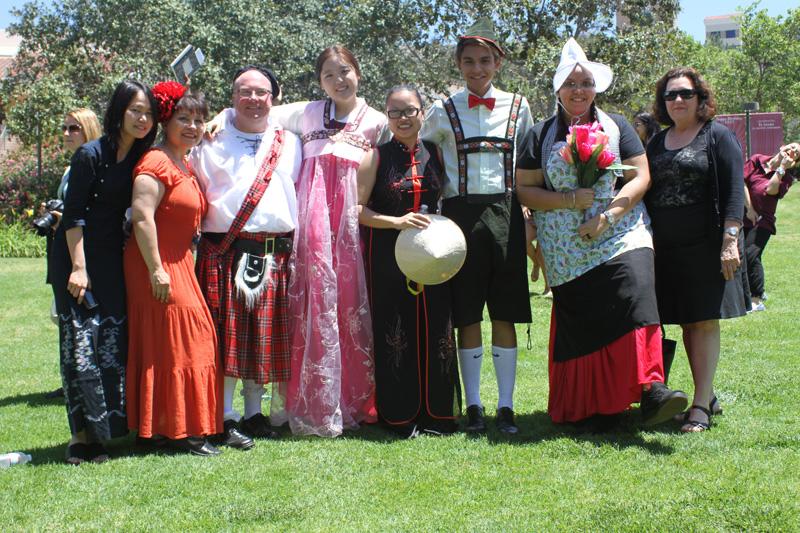International Students Choose the U.S.
International students and counselors wear traditional attire at Plaza Vaquero during ISA Day in May 2013
With so many study abroad programs available all over the world, why do students choose to study in United States? The number of international students at colleges and universities throughout the United States has increased over the past several years.
“In my native country, if you have an American education, it means that every single door is open in front of you,” said Mary Akopyan, an international student from Moscow, Russia.
In Russia, students tend to go to public universities, because public education is better than private there. American students, on the contrary, tend to go to private universities, because they can get more out of it, and receive better knowledge. Even though it costs more.
One of the reasons why Russian students choose to study in the U.S. is that they can get more practical education out of the university, while Russian education provides mostly theoretical.
“The weirdest thing for me in American university education is that students in take only 6-7 courses per semester,” said Akopyan. “We had to take nine necessary courses and three additional ones that we could choose on our own.”
In Russia, the general perception about the American university education system is that a diploma from the U.S. will bring more opportunities and possibilities.
Nabil Hanafi, an international student from Germany, after graduating from high school, came to the U.S. for the first time when he was in an au-pair program in 2008, a social program where a young adult from another country lives with a family and provides in-home childcare services.
“I was taking care of an autistic child for six months in Philadelphia,” said Hanafi. “I was doing something good, and it was a new challenge for me.”
During that time he came to California for a vacation and made connections in Glendale.
In the spring of 2013, Nabil began his first semester at GCC as an international student.
Hanafi chose GCC over Pasadena because a friend from high school was studying here. Later his friend transferred to USC.
“The weather in L.A. is the main reason I came to California,” said Hanafi.
Hanafi lives on his savings with a host family and his own family supports him as well.
“ I want to go to UC Berkeley, because it has a big name in Tunisia,” said Hanafi. “And since my parents are originally from Tunisia, I want to end up there one day,” he said.
In Germany, students don’t pay for classes, they need only pay a fee each semester which is about $300. Since education is almost free in Germany, students choose universities that best apply to their major.
For Martin Olsson, an international student from Sweden, this is the first semester in a U.S. college. With a student visa, students have to take at least 12 units per semester to stay in the U.S.
“My main goal was to have a fun trip and improve my English in L.A.,” Olsson said.
The university system in Sweden is very similar to Germany.
Olsson found GCC through an agency for international students. His decision came down to either the U.S. or Australia. In Australia, he could work and study, but here in America he is allowed to study only.
The agency had GCC on their brochure.
“I read about it, I liked it, and it also was cheaper than other colleges,” said Olsson.
The U.S. university system and the Russian system are very prestige oriented – when one states their degree, they immediately add the name of the school where it was obtained. In contrast, the German and Swedish university systems are largely homogeneous and degrees are perceived to be equivalent.
Many international students chose GCC for its location and affordability.

Araks was a founder and an Editor-In-Chief of the first ever school newspaper in her high school in Moscow. After graduating she entered the Faculty of...

